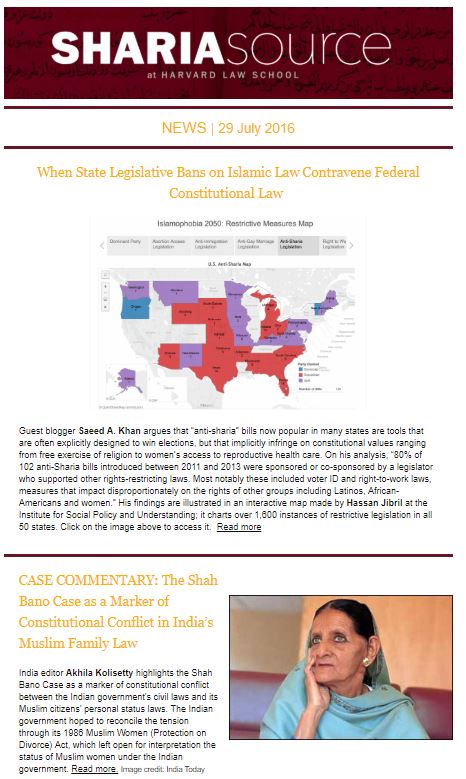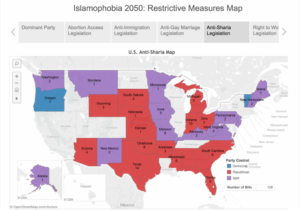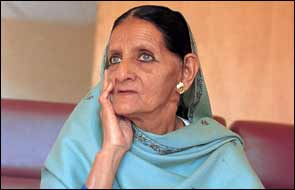
 When State Legislative Bans on Islamic Law Contravene Federal Constitutional Law Guest blogger Saeed A. Khan argues that “anti-sharia” bills now popular in many states are tools that are often explicitly designed to win elections, but that implicitly infringe on constitutional values ranging from free exercise of religion to women’s access to reproductive health care. On his analysis, “80% of 102 anti-Sharia bills introduced between 2011 and 2013 were sponsored or co-sponsored by a legislator who supported other rights-restricting laws. Most notably these included voter ID and right-to-work laws, measures that impact disproportionately on the rights of other groups including Latinos, African-Americans and women.” His findings are illustrated in an interactive map made by Hassan Jibril at the Institute for Social Policy and Understanding; it charts over 1,600 instances of restrictive legislation in all 50 states. Click on the image above to access it. Read more. Image Credit: https://www.ispu.org/visualization
When State Legislative Bans on Islamic Law Contravene Federal Constitutional Law Guest blogger Saeed A. Khan argues that “anti-sharia” bills now popular in many states are tools that are often explicitly designed to win elections, but that implicitly infringe on constitutional values ranging from free exercise of religion to women’s access to reproductive health care. On his analysis, “80% of 102 anti-Sharia bills introduced between 2011 and 2013 were sponsored or co-sponsored by a legislator who supported other rights-restricting laws. Most notably these included voter ID and right-to-work laws, measures that impact disproportionately on the rights of other groups including Latinos, African-Americans and women.” His findings are illustrated in an interactive map made by Hassan Jibril at the Institute for Social Policy and Understanding; it charts over 1,600 instances of restrictive legislation in all 50 states. Click on the image above to access it. Read more. Image Credit: https://www.ispu.org/visualization
 CASE COMMENTARY: The Shah Bano Case as a Marker of Constitutional Conflict in India’s Muslim Family Law India editor Akhila Kolisetty highlights the Shah Bano Case as a marker of constitutional conflict between the Indian government’s civil laws and its Muslim citizens’ personal status laws. The Indian government hoped to reconcile the tension through its 1986 Muslim Women (Protection on Divorce) Act, which left open for interpretation the status of Muslim women under the Indian government. Read more. Image credit: India Today
CASE COMMENTARY: The Shah Bano Case as a Marker of Constitutional Conflict in India’s Muslim Family Law India editor Akhila Kolisetty highlights the Shah Bano Case as a marker of constitutional conflict between the Indian government’s civil laws and its Muslim citizens’ personal status laws. The Indian government hoped to reconcile the tension through its 1986 Muslim Women (Protection on Divorce) Act, which left open for interpretation the status of Muslim women under the Indian government. Read more. Image credit: India Today
 CASE DOCUMENT: Moh’d Ahmed Khan v. Shah Bano Begum et al. (Supreme Court of India, 1985) The Shah Bano case is a landmark and controversial case in India’s Supreme Court that dealt with the question of the length of time a Muslim ex-husband would have to provide his ex-wife with monthly maintenance payments after a divorce, under Muslim personal law and Indian civil law. Much debated in classrooms and casebooks on comparative constitutional law, it is one of the cases featured on SHARIAsource with commentary that helps place it in context. Read more. Image credit: mediadefence.org
CASE DOCUMENT: Moh’d Ahmed Khan v. Shah Bano Begum et al. (Supreme Court of India, 1985) The Shah Bano case is a landmark and controversial case in India’s Supreme Court that dealt with the question of the length of time a Muslim ex-husband would have to provide his ex-wife with monthly maintenance payments after a divorce, under Muslim personal law and Indian civil law. Much debated in classrooms and casebooks on comparative constitutional law, it is one of the cases featured on SHARIAsource with commentary that helps place it in context. Read more. Image credit: mediadefence.org
See the full newsletter.

